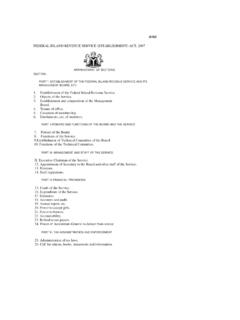Transcription of A QUICK GUIDE TO PHILIPPINE DATA PRIVACY LAW …
1 August 2017 | 1 Clifford Chance A QUICK GUIDE TO PHILIPPINE DATA PRIVACY LAW COMPLIANCE The Philippines has always had PRIVACY laws from fundamental pronouncements in the Constitution, to specific protections for bank accounts, private conversations and privileged communications. But it was only in 2012 that a general PRIVACY statute on personal data was enacted. The Data PRIVACY Act of 2012 ('DPA') was modelled after the EU Data Protection Directive (95/46/EC) (the 'EU Directive'), and a QUICK glance at the law will show that it adopts terminology and principles common to PRIVACY regimes and policies in other countries.
2 THE DPA Republic Act No. 10173 (also known as the Data PRIVACY Act of 2012) is founded on the policy of the State to protect the fundamental human right to PRIVACY of communication while ensuring free flow of information to promote innovation and [and] the [State s] inherent obligation to ensure that personal information in information and communications systems in government and in the private sector are secured and protected. National PRIVACY Commission The DPA creates the National PRIVACY Commission ('NPC'), the agency tasked with administering and implementing the provisions of the act.
3 It is headed by a PRIVACY Commissioner, assisted by two deputy commissioners . It is attached to the Department of Information and Communications Technology, which itself was only created in 2016. The NPC has the following powers: Monitor and ensure compliance with the DPA, as well as the rules and regulations implementing its provisions; Receive and resolve complaints and institute investigations; Issue cease and desist orders and impose a temporary or permanent ban on personal information processing; General authority to compel any entity, public or private, to abide by its orders or to take action in a matter affecting data PRIVACY .
4 Recommend the prosecution and imposition of penalties specified in the DPA to the Department of Justice; Key points DPA was modelled after the EU Directive. The DPA regulates the collection and processing of personal information. Certain types of personal information are considered sensitive personal information ('SPI'). Certain controllers and processors must have their data processing systems registered with the NPC by September 9, 2017. Consent is a lawful basis for the collection and processing of both personal information and SPI.
5 In light of the growing emphasis on (and extra-territorial effect of) cyber security and data PRIVACY laws across Asia and the EU, multinational corporations (including those operating in, and from, the Philippines) should be vigilant in handling personal data and be aware of the exposure to international regulatory and enforcement risks. A QUICK GUIDE TO PHILIPPINE DATA PRIVACY LAW COMPLIANCE 2 | August 2017 Clifford Chance Provide guidance on the protection of data PRIVACY ; and Facilitate cross-border enforcement of data PRIVACY laws.
6 Laws and issuances Apart from the DPA, which became effective on November 3, 2012, the following NPC issuances should be taken note of: Implementing Rules and Regulations (IRR) of the DPA dated August 24, 2016. NPC Circular No. 16-01 dated October 10, 2016, which deals with the security of personal data in government agencies. NPC Circular No. 16-02 dated October 10, 2016, on data sharing agreements with the government. NPC Circular No. 16-03 dated December 15, 2016, on personal data breach management which sets out the requirements for data security breach notification.
7 NPC Circular No. 16-04 dated December 15, 2016, which is the NPC s rules of procedure. NPC Advisory No. 2017-01 dated March 14, 2017, which provides guidance on the appointment of data protection officers. It is expected that the NPC will continue to issue a number of new circulars, in efforts to further implement the DPA. Cyber security Those looking into local cyber security law issues may also wish to take note of a statute enacted the same year as the DPA, Republic Act No. 10175 (also known as the Cybercrime Prevention Act).
8 This aims to promote and protect the security of cyber systems. This law characterises certain acts as offences against the confidentiality, integrity and availability of computer data and systems ( illegal access to the whole or part of any computer system, intentional or reckless alteration or damaging of computer data), computer-related offences ( , forgery and identity theft) or content-related offences such as libel committed through a computer system. DPA in a nutshell The DPA regulates the collection and processing of personal information, that is, any information whether recorded in a material form or not, from which the identity of an individual is apparent or can reasonably and directly be ascertained by the entity holding the information, or when put together with other information would directly and certainly identify an individual.
9 Sensitive personal information Certain types of personal information are considered sensitive personal information . SPI refers to information involving matters such as race, ethnic origin, marital status, age, colour, and religious, philosophical or political affiliations, health, education, genetic or sexual life of a person, or to any proceedings for any offence committed or alleged to have been committed by such person. It also includes personal information issued by government agencies that is peculiar to an individual, such as his or her social security number or licences.
10 In general, the requirements and standards for collecting and processing sensitive personal information are more restrictive and sanctions for breaches involving SPI are graver. It is expected that the NPC will continue to issue a number of new circulars, in efforts to further implement the DPA. A QUICK GUIDE TO PHILIPPINE DATA PRIVACY LAW COMPLIANCE August 2017 | 3 Clifford Chance In general, regulation is in the form of: 1. A requirement that collection and processing of personal data must be pursuant to at least one criteria for lawful processing.











